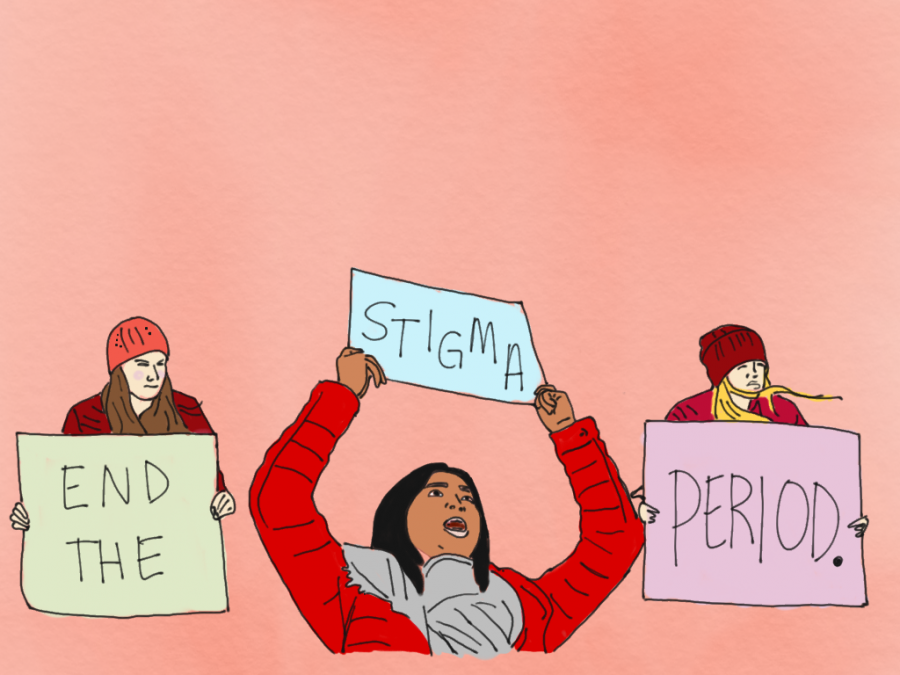It’s time to end the stigma. Period.
February 28, 2020
The swimming unit in P.E. class can be painful for many people: getting in the cold water in the middle of the day, walking around school with wet hair and wet clothes, and smelling like chlorine for weeks on end.
But this process only gets worse when teachers start talking to girls about “taking your days” when it’s “that time of the month.” Not only is this discussion uncomfortable for everyone and excluding to transgender and non-binary individuals, the fact is that many people don’t “take their days.” I know I don’t. I desperately want to avoid the embarrassment, the feeling that everybody knows a piece of personal information about me. I want to prove that I can participate and live to the fullest extent despite the sometimes agonizing feelings in my body. Over many years, the stigma around periods has made me hide mine in a variety of ways, walking to the bathroom with a tampon hidden under my sleeve or getting in the pool when I feel painful cramps in my stomach, but there’s no reason to keep living like this.
Period stigma is the idea that people feel uncomfortable talking about menstruation because they are taught to hide and be embarrassed about having their periods. People who have periods are often socialized to believe that something is wrong with their bodies—that there is something that needs to be hidden—when in fact it’s really just a normal process that more than half the world experiences. Implicit in the discussion of period stigma is gender inequality. Cisgender men are still the norm, and those who identify differently are taught that in order to be respected, they must hide their pain in order to appear strong.
Because of this, they often pretend that periods don’t exist, even when feeling discomfort or pain. Period stigma exists here at ETHS. The feeling of sitting out of swimming in P.E. class is a perfect example.
“I know students, including myself, have felt like it’s not acceptable. It feels like a punishment because I would have to work out on the side of the pool while my entire class would be able to see me… I’ve had P.E. teachers who have required a note from a parent or doctor before taking days off of swimming, making the process significantly more challenging instead of just trusting students about their own bodies,” says junior Anna Taufen.
Additionally, some teachers and staff are not receptive to students’ basic needs, refusing to let students go to the bathroom during their class or go to the nurse if they are in pain.
“I’ve had teachers that limit the amount of times you’re allowed to leave the class to go to the bathroom, and it is hard to approach them because of the stigma that exists in the first place… No one should have to ask for permission for a basic human need,” explains Taufen.
Stigma is real and has far reaching consequences. A survey commissioned by Thinx, a maker of period proof underwear, and PERIOD, a nonprofit leading “The Menstrual Movement,” found that 80 percent of teens surveyed feel there is a negative association with periods, that they are gross or unsanitary. 57 percent have felt personally affected by the same negative association.
As stated in the survey, “negative associations with menstruation are powerful, have been found to contribute to ‘self-objectification, body shame, and lack of agency in sexual decision-making’ for young people.”
Sophomore Chloe Byrne, a participant in a Civics in Action project about period stigma, says that one important thing she
has learned is that “[w]e can change minds.”
There are actions we can take as a community to combat stigma. We must challenge stigma through conversation in and outside
of class. The more we talk about periods just as a fact of life, the more we normalize them. The more we stop using coded language like “that time of the month,” the more we recognize that we don’t need to hide these conversations behind laughable terms instead of just talking about it openly and honestly. Discussions about periods also have to extend beyond people who experience them.
“I have learned just how uncomfortable some males are with the subject of menstruation. When [a student] initially gave her speech about menstrual shaming/stigma, one male student in our class was so uncomfortable that he had to leave the room,” Byrne explains.
Without the engagement of people who don’t have periods, the stigma will persist, because these conversations will continue to be taboo and silenced. Teachers can also help combat stigma. The same survey from Thinx showed that 25 percent of teens have missed class due to lack of access to period products, but we can make sure that happens far less. If possible, teachers should make the effort to provide menstrual products in their classroom, and make it clear to their students that this is
something they offer.
History teacher Matthew Walsh, who offers menstrual products and other necessities in his classroom, emphasizes their importance.
“Students who have their periods should not be shamed. Period. Making students go to the nurse or find a bathroom where there might be products available seems ridiculous… why would I want students to miss class wandering the school looking for things
I can easily and cheaply provide?” Walsh says.
The end of period stigma must go beyond interpersonal relationships. The ETHS administration has to make institutional changes and prove that it too is not afraid to have these conversations. It needs to consistently provide access to high-quality, usable menstrual products—not the existing products currently found in some bathrooms—with working and full machines. They should be in all bathrooms, regardless of gender, because people of different gender identities can have periods.
Period stigma is deeply rooted in our society, but that doesn’t mean it’s impossible to change. As a community, we must take action to change the perceptions around periods. As Walsh states, it’s necessary “to discuss whose ‘stuff’ gets shamed and why our culture thinks that something so normal and natural is viewed as disgusting by many.”
Dominant culture has convinced most people that periods are something to be embarrassed of. Many of us grow up believing that something so normal is so embarrassing.
Period stigma is not only negative, it’s dangerous, and it’s time to end it. Period.




















